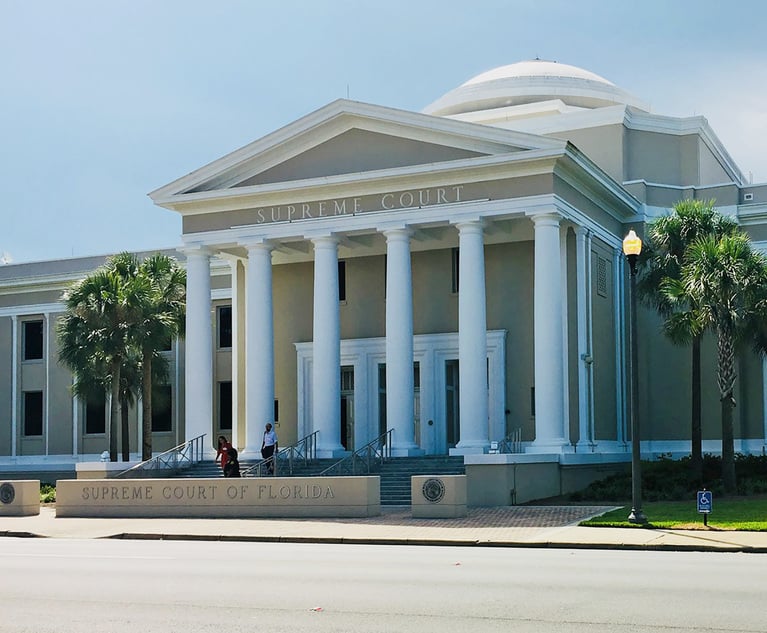FAMU Students File Lawsuit Alleging Funding Discrimination
The plaintiffs, who are Black FAMU students, alleged that the state has failed to fund and support FAMU in the same way as it has for majority white institutions.
September 23, 2022 at 11:43 AM
5 minute read
 Photo: Adobe Stock
Photo: Adobe Stock Arguing that the state has failed to meet funding obligations and other commitments to Florida A&M University, six students on Thursday filed a potential class-action lawsuit accusing state officials of "intentional discrimination" against the historically Black school.
The federal lawsuit alleged that the state has maintained "a segregated system of higher education" and that Florida's disparate funding and support for FAMU violated constitutional equal-protection rights.
The state of Florida, the Board of Governors for the state's university system and Chancellor Marshall Criser are named as defendants in the federal lawsuit, which was filed in the Northern District of Florida.
The legal complaint also maintained that the state has failed to meet obligations under a partnership agreement with the U.S. Department of Education's Office of Civil Rights. The five-year "Partnership Agreement," which concluded in 2003, was aimed at increasing access for minority students at all levels of education.
The plaintiffs, who are Black FAMU students, alleged that the state has failed to fund and support FAMU in the same way as it has for majority white institutions.
"Throughout its history and up to the present day, Florida has purposefully engaged in a pattern and practice of racial discrimination, principally through disparate funding, that has prevented HBCUs (Historically Black Colleges and Universities), including FAMU, from achieving parity with their traditionally White institution ("TWI") counterparts," the lawsuit said.
The plaintiffs are asking a federal judge to decide that the state has violated the students' constitutional equal-protection rights and the 1964 Civil Rights Act. The lawsuit, which requests the appointment of a mediator to recommend a remedy to the court, seeks "to make FAMU whole" and for FAMU to achieve parity with the state's traditionally white institutions within the next five years.
A spokeswoman for the state university system's Board of Governors declined to comment about the lawsuit on Thursday.
The 26-page complaint laid out numerous actions that plaintiffs' lawyers maintained demonstrate how the state and its higher-education officials have undermined FAMU's ability to succeed as an institution and, in turn, hindered its students' success.
The lawsuit highlighted the "unnecessary duplication of FAMU's academic programs at TWIs (traditionally white institutions) that are geographically proximate to FAMU."
As an example, the complaint pointed to the FAMU-Florida State University College of Engineering, a joint engineering institution for the two schools.
Since the joint program was established in 1982, the number of FAMU students participating in it has decreased while the number of FSU students has grown, according to the complaint.
The lawsuit noted that the budget authority for the program was moved from FAMU to FSU in 2015.
"At the heart of this complaint is a level playing field for students that go to historically Black colleges and universities. And in the state of Florida, the numbers don't lie, and the history doesn't lie. They say the truth and facts are stubborn things, and they are," Josh Dubin, a Miami attorney who represents the plaintiffs, told The News Service of Florida on Thursday.
The plaintiffs also are asking U.S. District Judge Robert Hinkle to certify the case as a class action to represent all of the students enrolled at FAMU during the 2021-22 academic year through the date of the certification. Roughly 10,000 students currently attend the school, according to the lawsuit.
Arguing that the number of major building projects at the school has been "constrained," the plaintiffs' lawyers argued that the state has failed to meet an obligation to enhance FAMU's facilities to achieve parity with traditionally white institutions.
"For instance, in 2020, FAMU, which had approximately 9,400 students and $111 million in facilities debt, had to plead for $33,000 in funding from the student government to reopen its 60,000-square-foot recreation center in February 2021," the lawsuit said.
The legal challenge also pointed to a recent controversy involving student housing at FAMU. Hundreds of students were moved from a student dormitory to temporary housing weeks after school began in August because of problems such as pest issues and flood damage.
Dubin said the plaintiffs — Britney Denton, Nyabi Stevens, Deidrick Dansby, Fayerachel Peterson, Alexander Harris, and a student identified as "John Doe" — are seeking "an equal right to the same sort of education and the same sort of resources and facilities that should be provided to their university."
Under Florida's performance-based funding model for universities, FAMU has been allocated millions of dollars less than predominantly white institutions such as the University of Florida, the lawsuit said.
The lawsuit argued that the system of metrics that drives that allocation of funds "unfairly compares schools that serve student populations of different socioeconomic backgrounds."
The disparities have resulted in FAMU's student graduation and retention rates, support for campus programs, and diversity of faculty and staff lagging in comparison to other Florida universities, according to the lawsuit.
The lawsuit seeks change "here and now and for the future," attorney Barbara Hart, who also represents the plaintiffs, said in a press release announcing the lawsuit.
"While Florida works to provide a quality education at traditionally white institutions, its treatment of HBCUs has hardly evolved from the middle of the 20th century. FAMU is more dependent on state funding than other schools, yet Florida education policy treats it as little more than an after-thought," said Hart, an attorney with the Grant & Eisenhofer, P.A. firm.
This content has been archived. It is available through our partners, LexisNexis® and Bloomberg Law.
To view this content, please continue to their sites.
Not a Lexis Subscriber?
Subscribe Now
Not a Bloomberg Law Subscriber?
Subscribe Now
NOT FOR REPRINT
© 2025 ALM Global, LLC, All Rights Reserved. Request academic re-use from www.copyright.com. All other uses, submit a request to [email protected]. For more information visit Asset & Logo Licensing.
You Might Like
View All

U.S. Eleventh Circuit Remands Helms-Burton Trafficking Case Involving Confiscated Cuban Port
3 minute read
Miami Lawyer Guilty of Indirect Criminal Contempt But Dodges Paying Legal Fees
4 minute read
Law Firms Mentioned
Trending Stories
- 1Public Notices/Calendars
- 2Monday Newspaper
- 3Judicial Ethics Opinion 24-98
- 4'It's Not Going to Be Pretty': PayPal, Capital One Face Novel Class Actions Over 'Poaching' Commissions Owed Influencers
- 511th Circuit Rejects Trump's Emergency Request as DOJ Prepares to Release Special Counsel's Final Report
Who Got The Work
Michael G. Bongiorno, Andrew Scott Dulberg and Elizabeth E. Driscoll from Wilmer Cutler Pickering Hale and Dorr have stepped in to represent Symbotic Inc., an A.I.-enabled technology platform that focuses on increasing supply chain efficiency, and other defendants in a pending shareholder derivative lawsuit. The case, filed Oct. 2 in Massachusetts District Court by the Brown Law Firm on behalf of Stephen Austen, accuses certain officers and directors of misleading investors in regard to Symbotic's potential for margin growth by failing to disclose that the company was not equipped to timely deploy its systems or manage expenses through project delays. The case, assigned to U.S. District Judge Nathaniel M. Gorton, is 1:24-cv-12522, Austen v. Cohen et al.
Who Got The Work
Edmund Polubinski and Marie Killmond of Davis Polk & Wardwell have entered appearances for data platform software development company MongoDB and other defendants in a pending shareholder derivative lawsuit. The action, filed Oct. 7 in New York Southern District Court by the Brown Law Firm, accuses the company's directors and/or officers of falsely expressing confidence in the company’s restructuring of its sales incentive plan and downplaying the severity of decreases in its upfront commitments. The case is 1:24-cv-07594, Roy v. Ittycheria et al.
Who Got The Work
Amy O. Bruchs and Kurt F. Ellison of Michael Best & Friedrich have entered appearances for Epic Systems Corp. in a pending employment discrimination lawsuit. The suit was filed Sept. 7 in Wisconsin Western District Court by Levine Eisberner LLC and Siri & Glimstad on behalf of a project manager who claims that he was wrongfully terminated after applying for a religious exemption to the defendant's COVID-19 vaccine mandate. The case, assigned to U.S. Magistrate Judge Anita Marie Boor, is 3:24-cv-00630, Secker, Nathan v. Epic Systems Corporation.
Who Got The Work
David X. Sullivan, Thomas J. Finn and Gregory A. Hall from McCarter & English have entered appearances for Sunrun Installation Services in a pending civil rights lawsuit. The complaint was filed Sept. 4 in Connecticut District Court by attorney Robert M. Berke on behalf of former employee George Edward Steins, who was arrested and charged with employing an unregistered home improvement salesperson. The complaint alleges that had Sunrun informed the Connecticut Department of Consumer Protection that the plaintiff's employment had ended in 2017 and that he no longer held Sunrun's home improvement contractor license, he would not have been hit with charges, which were dismissed in May 2024. The case, assigned to U.S. District Judge Jeffrey A. Meyer, is 3:24-cv-01423, Steins v. Sunrun, Inc. et al.
Who Got The Work
Greenberg Traurig shareholder Joshua L. Raskin has entered an appearance for boohoo.com UK Ltd. in a pending patent infringement lawsuit. The suit, filed Sept. 3 in Texas Eastern District Court by Rozier Hardt McDonough on behalf of Alto Dynamics, asserts five patents related to an online shopping platform. The case, assigned to U.S. District Judge Rodney Gilstrap, is 2:24-cv-00719, Alto Dynamics, LLC v. boohoo.com UK Limited.
Featured Firms
Law Offices of Gary Martin Hays & Associates, P.C.
(470) 294-1674
Law Offices of Mark E. Salomone
(857) 444-6468
Smith & Hassler
(713) 739-1250






